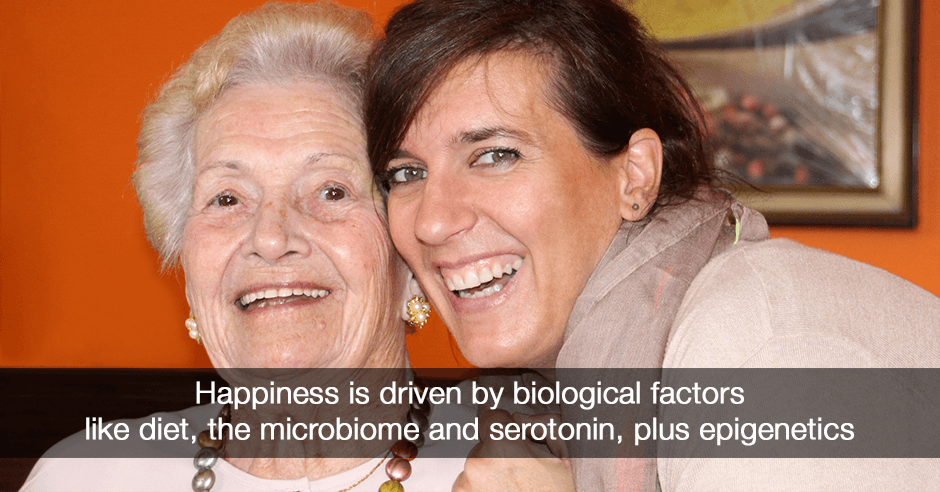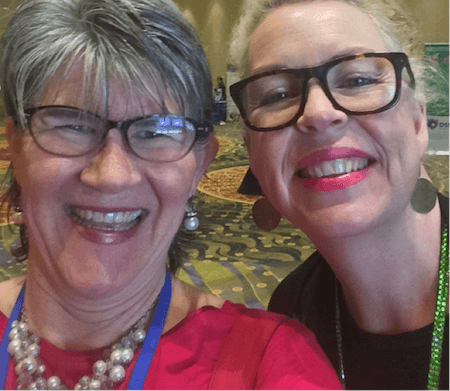
As a food mood expert and nutritionist, I believe one very overlooked way we can address the lack of happiness or joy is the biochemical aspect.
One classic root cause of depression or unhappiness is low serotonin and this low serotonin can also lead to fear, worry, anxiety, self-doubt, lack of confidence, ruminations, insomnia and imposter syndrome, all of which are classic signs of low serotonin.
A poor diet or a diet that is not right for you is a big factor in serotonin production and therefore happiness and a sense of calm.
The biological or biochemical connections to lack of happiness
This paper, Happiness & Health: The Biological Factors – Systematic Review Article, supports the biological or biochemical connections to lack of happiness (and the other signs of low serotonin), listing endogenic (or internal) as well as exogenic (or external) factors :
Happiness underlying factors are considerable from two dimensions:
- endogenic factors (biological, cognitive, personality and ethical sub-factors) and
- exogenic factors (behavioral, social/cultural, economical, geographical, life events and aesthetics sub-factors).
Among all endogenic [or internal] factors, biological sub-factors are the significant predictors of happiness.
The external factors are the ones we’re most familiar with i.e. things that are going on in our lives like relationships, income, where we live and life events. It’s the internal factors that we don’t discuss.
This study looked at biological factors (one of the internal factors) that underlie happiness and optimism. Five sub-groups of biological factors were found:
- brain and neurotransmitters (dopamine, serotonin and endorphins playing a role in happiness)
- endocrinology and hormones (cortisol and oxytocin playing a role in happiness)
- physical health
- physical attractiveness
- genetic (this accounted for 35-50% of happiness)
Nutritional psychiatry and the first 4 sub-groups
The work of nutritional psychiatry, a new and growing field, shows that food and nutrients have a direct impact on the first 4 groups: brain and neurotransmitters, on endocrinology and hormones and on physical health (and thereby physical attractiveness too):
The International Society for Nutritional Psychiatry Research hosted their first international conference in August last year in Bethesda, MD, and I had the pleasure of attending.
The new SMILES trial was presented at the conference: the first randomized controlled diet depression study where ONE THIRD of the dietary intervention group saw improvements in their depression and anxiety symptoms by switching from processed/junk food to real food with no specific dietary restrictions.

I participated in the rapid fire presentation session at the conference. In my talk, Applications of the Paleo diet and Gluten-free diet for Anxiety, I shared how Paleo and grain-free diets can increase happiness and reduce anxiety.
This November 2017 review, Nutritional psychiatry: the present state of the evidence, mentions the SMILES trial and provides the latest overview of the evidence in nutritional psychiatry:
Potential biological pathways related to mental disorders include inflammation, oxidative stress, the gut microbiome, epigenetic modifications and neuroplasticity. Consistent epidemiological evidence, particularly for depression, suggests an association between measures of diet quality and mental health, across multiple populations and age groups; these do not appear to be explained by other demographic, lifestyle factors or reverse causality.
Genetics (the last sub-group), epigenetics, diet and the microbiome
It saddens me when I hear someone say: “depression runs in my family – my grandmother suffered, I suffer with depression and I don’t know what kind of life my daughter is going to have.”
Even though genetics (the last sub-group) is reported to accounted for 35-50% of happiness, we now know that “our genes are not our destiny” and we can actually switch on good genes and switch off bad genes when we change our diet and environment.
This paper, Microbiome, inflammation, epigenetic alterations, and mental diseases, sums it up perfectly, reporting that recent findings show that the onset and development of mental diseases such as autism, bipolar disorder, schizophrenia, and depression cannot be well described by the one-gene/one-disease approach:
Even though the involvement of many genes are likely, up regulating and activation or down regulation and silencing of these genes by the environmental factors play a crucial role in contributing to their pathogenesis. Much of this interplay may be moderated by epigenetic changes.
Environmental factors such as diet, gut microbiota, and infections have significant role in these epigenetic modifications.
The authors conclude that the potential interactions of diet, gastrointestinal microbiome, and inflammation can all contribute to epigenetic alterations in psychiatric disorders.
If the term epigenetic is new to you, here is a helpful explanation:
The word “epigenetic” literally means “in addition to changes in genetic sequence.” The term has evolved to include any process that alters gene activity without changing the DNA sequence, and leads to modifications that can be transmitted to daughter cells.
What this means is that you can change your destiny in a positive way – by changing your diet – even if you have bad genes passed on from your grandmother and mother or other family members.
And don’t forget the environmental factors (as stated in the above paper) that can change your genes in a negative way: heavy metals, pesticides, diesel exhaust, tobacco smoke, polycyclic aromatic hydrocarbons (environmental pollutants from coal, oil, petrol, and wood), radioactivity, viruses and bacteria.
The take-aways are to eat quality real whole food, avoid sugar, caffeine and gluten, address the microbiome and nutritional deficiencies, avoid toxins/chemicals, detox if needed, address infections and the adrenals. This is exactly what my book The Antianxiety Food Solution covers so if you don’t yet have a copy, grab one from your nearest bookstore or from Amazon here (my affiliate link).
For a deeper dive into the epigenetics aspect and detoxification, I recommend Dr. Ben Lynch’s new book called Dirty Genes (my Amazon link).
Are you ready to find the biological root causes of your lack of happiness and anxiety?
Or are you already there and have seen the benefits already?
I think it’s important to consider the full segment of text rather than just the feel good part. “but who will by no means clear the guilty, visiting the iniquity of the fathers on the children and the children’s children, to the third and the fourth generation.” God loves and forgives us, but sin still has consequences. The more I learn about epigenetic changes and adverse childhood experiences, the more I understand the weight of the rest of that segment. God loves us, but we have to act with love as well if we want to protect our future generations from harm.
Wow exactly, well said, we can do a lot of work on eating right and trying to be happpy, but if we don’t get it right with Gods love and ask for his Grace & forgiveness…! We don’t move forward. It’s all contacted and work together, love your words. Blessings Katreena
A friends daughter is struggling with depression and anxiety amongst other and I suggested some further reading on biochemistry and amino acids. The daughter is a strict vegan. She got back to me with this article. I do understand that big pharmacy and amino acids are different and that counselling can be invaluable, I can’t ignore my own experience of amino acids helping immensely and immediately in my case and the case of many others. I don’t want to disagree with her but I’d hate to see her discount amino acids in helping her daughter get well.
https://robynchuter.substack.com/p/the-biochemical-imbalance-theory
Lesley
You are so kind to ask on behalf of your friend. Hopefully she won’t base her decision on one blog post. I’d share some of my blogs and give her a copy of my book (heavily referenced)
Here are some relevant blogs
Tryptophan for my teenager: she laughs and smiles, her OCD and anxiety has lessened, and she is more goal oriented and focused on school https://www.everywomanover29.com/blog/tryptophan-for-my-teenager-she-laughs-and-smiles-her-ocd-and-anxiety-has-lessened-and-she-is-more-goal-oriented-and-focused-on-school/
Rage, anxiety, cravings & insomnia in 11-year old girl with RAD/reactive attachment disorder: chewable tryptophan turns things around https://www.everywomanover29.com/blog/rage-anxiety-cravings-insomnia-in-11-year-old-girl-with-rad-reactive-attachment-disorder-chewable-tryptophan-turns-things-around/
Since starting GABA my child sleeps for the first time in years and really notices a difference in his carb cravings https://www.everywomanover29.com/blog/since-starting-gaba-my-child-sleeps-for-the-first-time-in-years-and-really-notices-a-difference-in-his-carb-cravings/
If she is new to the amino acids (and other anxiety nutrition solutions like gluten/sugar/caffeine removal, blood sugar control, gut health, pyroluria etc) my book “The Antianxiety Food Solution” is a great place to start. More here https://www.everywomanover29.com/blog/the-antianxiety-food-solution-by-trudy-scott/
Thanks so much for your reply Trudy. I really appreciate it.
Lesley